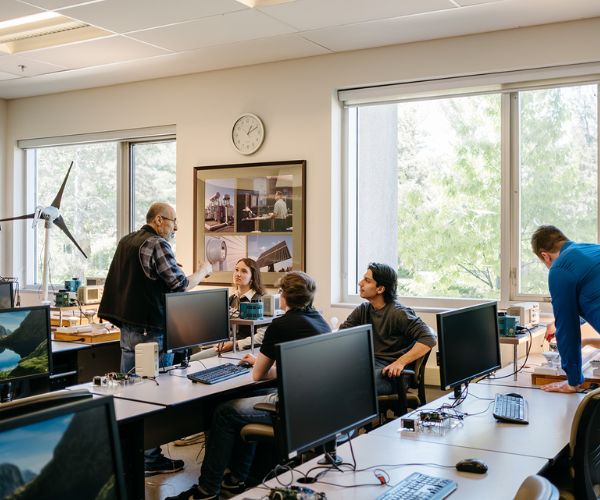Visit Carleton! Book your tour today.
Program Details
There is an increasing demand for clean sources of energy such as nuclear, wind, solar, geothermal, hydropower and biomass energies. Truly sustainable development will require the clever integration of renewable energy technologies into existing infrastructure, along with vastly improved efficiencies in non-renewable energy use.
The Faculty of Engineering and Design’s Sustainable and Renewable Energy Engineering (SREE) program provides analytical and hands-on skills for designing, building, operating and enhancing sustainable energy systems that combine energy generation, distribution and utilization in an environmentally responsible and economically beneficial manner.
Streams
We offer two streams:
- Smart Technologies for Power Generation and Distribution
- Efficient Energy Generation and Conversion
The Bachelor of Engineering’s Sustainable and Renewable Energy Engineering program is fully accredited by the Canadian Engineering Accreditation Board, allowing graduates to meet the educational requirements for registering as a professional engineer.
State-of-the-Art Facilities
You will have access to facilities such as an energy, combustion and air emissions laboratory; a fuel cell development laboratory; a thermodynamics/energy conversion laboratory; a power electronics and smart grids laboratory; and a microfabrication facility.
Work Experience
A Co-op option is available. Co-op is the opportunity to get a head start on a career. Co-op work terms allow for the development of key employability skills, exploration of career options and graduation with tangible, workplace experience.

Get started in Carleton360 to receive tailored information on our programs, student services and community.

Career Outcomes
Explore your passions, refine new skills and discover the career that’s right for you.
The Sustainable and Renewable Energy Engineering program provides you with the analytical, technical and marketing skills needed to design, build, operate and enhance sustainable energy systems.
Sample Careers

Sample Courses
ECOR 1048 - Dynamics
Kinematics and kinetics of a particle. Principle of work and energy. Conservation of energy, conservative forces, potential energy. Principles of impulse and momentum, conservation of momentum for a system of particles.
SREE 4001 - Efficient Energy Conversion
Sustainable large-scale power generation. Geothermal, solar thermal, hydrogen power plants. Thermal grids and thermal energy storage. Environmental and economic aspects of power generation. Impacts of intermittent power generation. Sizing of wind, solar PV, run-of-river hydro, and offshore power plants. Current and future energy network topologies.
Visit the Undergraduate Calendar to view a comprehensive list of course offerings for this program and discover the exciting things Carleton students are learning in the classroom!

